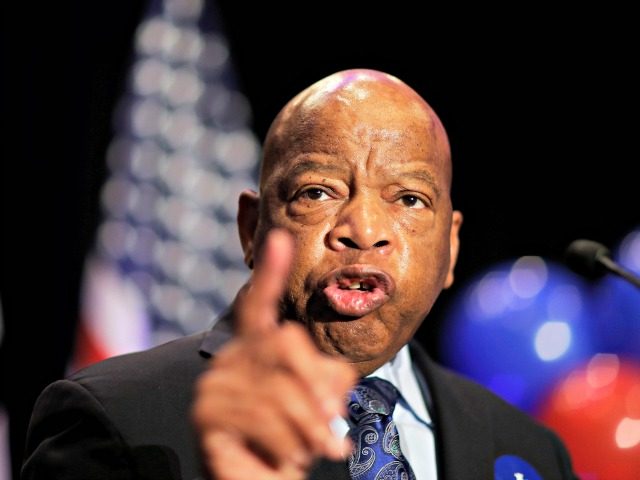The late Rep. John Lewis (D-GA) is being remembered by President Donald Trump the way he ought to be remembered — namely, for his heroic leadership in the civil rights movement.
As head of the Student Nonviolent Coordinating Committee (SNCC), he helped lead the iconic non-violent protests of the era.
Born into a family of sharecroppers, he worked and studied his way to American Baptist Theological Seminary. In 1959, Lewis trained in the tactics of non-violent resistance that would define the civil rights movement — and were the key to its appeal. He joined the Freedom Rides in 1961, and the March on Washington in 1963. He was infamously beaten at the Edmund Pettus Bridge in Selma, Alabama, in 1965, where he suffered a fractured skull. But he emerged victorious, and saw civil rights become a reality for all Americans. He brought America closer to the fulfillment of our founding ideals.
That is how he should be remembered — not for his recent politics.
Lewis was one of the most partisan members of the Democratic Party caucus, and he often exploited his civil rights record to smear his political opponents, falsely, as racists.
In 2008, for example, he attacked Republican presidential nominee Sen. John McCain (D-AZ) and his running mate, Gov. Sarah Palin (R-AK), by linking them to the white supremacist terrorists who bombed an Alabama church in 1963, killing four little girls. McCain never forgave him.
In 2010, Lewis made the false claim that participants in a Tea Party protest against Obamacare on Capitol Hill used the “N-word” against him. There was never any evidence whatsoever, despite the presence of hundreds of cameras.
When the late Andrew Breitbart offered $10,000, then $100,000, to the United Negro College Fund for video evidence of the word being used, no one responded. Instead, the media were outraged that anyone would accuse Lewis of lying — when he had.
In 2012 and 2016, Lewis compared Republican presidential candidates to Southern white (Democrat) segregationists. He also turned the floor of the House of Representatives — a democratically-elected legislative body — into a pantomime of a Jim Crow lunch counter protest, staging a sit-in for gun control in 2016 — as if gun ownership were not a civil right to which black Americans are also entitled. He called Trump a racist and pushed the “Russia collusion” hoax, among others.
In all of this, Lewis knew he was spending the political capital he had earned as a civil rights leader. But after so many years, that account was in overdraft. Instead of holding up the legacy of the civil rights struggle as one for all Americans, he turned it into a political cudgel — even on the left.
For example, Lewis once falsely accused Sen. Bernie Sanders (I-VT) of failing to participate in the civil rights struggle; Sanders was, in fact, arrested in a civil rights protest in 1963.
Lewis’s latest cause was a new version of the Voting Rights Act of 1965, after the obsolete Section 4 — federal supervision of certain states — was struck down by the Supreme Court in 2013.
According to House Majority Whip Rep. James Clyburn (D-SC), the best way to honor Lewis is to pass that law, which Democrats have already approved in the House. But that law would arguably hurt voting rights by making it harder to pass laws that screen out illegitimate voters.
Rep. Karen Bass (D-CA), the chair of the Congressional Black Caucus, violated basic decorum and common sense when she told President Trump on Saturday to “say nothing” about Lewis — as if he were not president, as if the civil rights movement were not a common legacy.
It was a shocking display of partisanship, even at a time when Americans are bitterly divided. And it was also thoroughly in keeping with John Lewis’s public rhetoric toward his Republican opponents.
The result of the degradation of the civil rights struggle is evident in the streets of America, where today’s left-wing activists say — wrongly — that Dr. Martin Luther King Jr. condoned rioting as a means of political change. The proud tradition of truly peaceful protest is all but forgotten.
I can attest to the fact that Lewis was a gentleman in private. His personal heroism will be remembered forever.
His partisan record in Washington will soon be forgotten — as it should be.
Joel B. Pollak is Senior Editor-at-Large at Breitbart News and the host of Breitbart News Sunday on Sirius XM Patriot on Sunday evenings from 7 p.m. to 10 p.m. ET (4 p.m. to 7 p.m. PT). His new book, RED NOVEMBER, tells the story of the 2020 Democratic presidential primary from a conservative perspective. He is a winner of the 2018 Robert Novak Journalism Alumni Fellowship. Follow him on Twitter at @joelpollak.

COMMENTS
Please let us know if you're having issues with commenting.